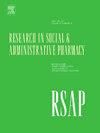Design and implementation of a risk-adapted, longitudinal, theory-driven medication adherence intervention: A protocol for a multi-phasic, hybrid effectiveness-implementation trial
IF 3.7
3区 医学
Q1 PUBLIC, ENVIRONMENTAL & OCCUPATIONAL HEALTH
Research in Social & Administrative Pharmacy
Pub Date : 2025-02-13
DOI:10.1016/j.sapharm.2025.02.006
引用次数: 0
Abstract
Background
The increasing use of targeted oral anticancer agents (OAAs) has transformed cancer treatment, yet patient adherence in real-world settings remains suboptimal. This protocol outlines a multi-phasic, hybrid effectiveness-implementation trial designed to develop, implement, and evaluate a risk-adapted, longitudinal medication adherence intervention for patients prescribed OAAs.
Methods
Drawing on social cognitive theory, intervention mapping, and implementation science, the study aims to address barriers at cognitive, behavioral, and environmental levels that impact adherence. Phase 1 identifies implementation barriers and refines strategies, informed by expert input and semi-structured interviews. Phase 2 incorporates patient-centered feedback to tailor a theory-driven intervention targeting adherence barriers. In Phase 3, the intervention is piloted across diverse clinical settings to assess its effectiveness and implementation feasibility.
Conclusion
This trial aims to deliver a scalable and sustainable model for adherence support, with broad implications for improving patient outcomes and integrating adherence monitoring in routine cancer care.
一项风险适应、纵向、理论驱动的药物依从性干预的设计和实施:一项多阶段、混合有效性实施试验的方案。
背景:越来越多地使用靶向口服抗癌药物(OAAs)已经改变了癌症治疗,但患者在现实环境中的依从性仍然不理想。本方案概述了一项多阶段、混合有效性实施试验,旨在开发、实施和评估针对处方OAAs患者的风险适应、纵向药物依从性干预。方法:利用社会认知理论、干预绘图和实施科学,研究旨在解决影响依从性的认知、行为和环境层面的障碍。第一阶段根据专家意见和半结构化访谈确定实施障碍并完善策略。第二阶段纳入以患者为中心的反馈,以定制理论驱动的干预措施,针对依从性障碍。在第三阶段,干预措施在不同的临床环境中进行试点,以评估其有效性和实施可行性。结论:该试验旨在提供可扩展和可持续的依从性支持模式,对改善患者预后和将依从性监测整合到常规癌症治疗中具有广泛意义。
本文章由计算机程序翻译,如有差异,请以英文原文为准。
求助全文
约1分钟内获得全文
求助全文
来源期刊

Research in Social & Administrative Pharmacy
PUBLIC, ENVIRONMENTAL & OCCUPATIONAL HEALTH-
CiteScore
7.20
自引率
10.30%
发文量
225
审稿时长
47 days
期刊介绍:
Research in Social and Administrative Pharmacy (RSAP) is a quarterly publication featuring original scientific reports and comprehensive review articles in the social and administrative pharmaceutical sciences. Topics of interest include outcomes evaluation of products, programs, or services; pharmacoepidemiology; medication adherence; direct-to-consumer advertising of prescription medications; disease state management; health systems reform; drug marketing; medication distribution systems such as e-prescribing; web-based pharmaceutical/medical services; drug commerce and re-importation; and health professions workforce issues.
 求助内容:
求助内容: 应助结果提醒方式:
应助结果提醒方式:


